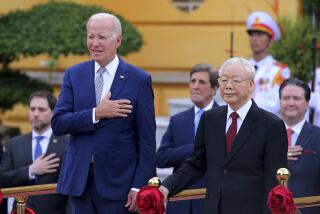U.S., Vietnam to Open Reciprocal Diplomatic Missions : Asia: Move seen as step toward normal relations. Hanoi office will aid MIA work, Washington says.
WASHINGTON â Twenty years after the fall of Saigon ended Americaâs longest war, the United States and Vietnam are on the verge of exchanging diplomatic missions, a probable first step toward normal relations.
State Department spokeswoman Christine Shelly said that the former enemies signed an agreement in Hanoi today settling property disputes left over from the war and establishing liaison offices in each otherâs capitals.
Indicative of the raw emotions still generated by the conflict, there was no corresponding ceremony in Washington. The agreement was announced less than 12 hours before the official documents were exchanged.
The Clinton Administration set aside objections from Capitol Hill and some veterans groups to establishing even low-level diplomatic ties before there is a complete accounting of the more than 2,000 service personnel still listed as missing from the war. Shelly said that the new office should help determine the fate of the missing.
âWe felt that by getting the liaison office open and also by directing one official who will be at that liaison office to work on this issue on a full-time basis, that that was a way that we could increase our ability to achieve the kind of accounting that we . . . desire,â Shelly said.
At the same time, U.S. officials said that the offices will not be upgraded to embassies until the MIA issue is resolved.
Liaison offices are the lowest level of representation that provides diplomatic immunity. Secretary of State Warren Christopher said this week that the United States would not consider stationing officials in Hanoi without that legal protection.
The United States and China exchanged liaison offices for about five years before establishing full diplomatic relations.
Officials said Vietnam has improved its cooperation with the United States on the MIA issue, turning over 61 sets of remains during the last year. Forty sets of remains were retrieved as a result of joint U.S.-Vietnamese efforts, while the rest were recovered by the Vietnamese.
*
The Vietnamese office will be established in the old South Vietnamese Embassy in Washington, which was abandoned in May, 1975, when the U.S.-backed South Vietnamese government collapsed in the face of advancing North Vietnamese troops. As a result of North Vietnamâs victory, the country was unified, with Hanoi as its capital.
The U.S. office will be established in a new nine-story office building in Hanoi. Officials said it is expected to open next Friday.
James Hall, the State Department official who has been Washingtonâs chief Vietnam watcher, will be in charge. He served as an Army captain in Vietnam during the war.
The South Vietnamese Embassy in Washington was boarded up for almost a decade after the fall of Saigon.
In recent years, the building has been used by the State Department as an office annex.
The opulent embassy was once a showcase for Vietnamese tapestries, silk paintings, modern paintings and 18th-Century artifacts. It also was a magnet for protests staged by Americans opposed to U.S. participation in the war.
For the large Vietnamese community in the United States, the agreement generated mixed emotions.
âThereâs no great excitement,â said Nguyen Ngoc Bich, a consultant to the Vietnamese Cultural Assn. of America. âThe majority of us are refugees who have no great love for the present regime. But it will make things simpler to deal with Vietnam.â
He said that the new liaison office will make it easier for Vietnamese Americans to obtain visas for travel to Vietnam for business or family visits.
Final negotiations for the exchange of diplomatic missions took almost a year after President Clinton ended the U.S. economic embargo on Vietnam Feb. 3. The last step was the resolution of property disputes and the restoration of diplomatic property.
Vietnam agreed to pay $208.5 million to settle private and U.S. government claims.
Times staff writer Aaron Nathans contributed to this report.
More to Read
Sign up for Essential California
The most important California stories and recommendations in your inbox every morning.
You may occasionally receive promotional content from the Los Angeles Times.










